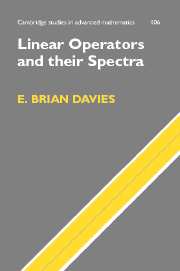Book contents
- Frontmatter
- Contents
- Preface
- 1 Elementary operator theory
- 2 Function spaces
- 3 Fourier transforms and bases
- 4 Intermediate operator theory
- 5 Operators on Hilbert space
- 6 One-parameter semigroups
- 7 Special classes of semigroup
- 8 Resolvents and generators
- 9 Quantitative bounds on operators
- 10 Quantitative bounds on semigroups
- 11 Perturbation theory
- 12 Markov chains and graphs
- 13 Positive semigroups
- 14 NSA Schrödinger operators
- References
- Index
10 - Quantitative bounds on semigroups
Published online by Cambridge University Press: 08 January 2010
- Frontmatter
- Contents
- Preface
- 1 Elementary operator theory
- 2 Function spaces
- 3 Fourier transforms and bases
- 4 Intermediate operator theory
- 5 Operators on Hilbert space
- 6 One-parameter semigroups
- 7 Special classes of semigroup
- 8 Resolvents and generators
- 9 Quantitative bounds on operators
- 10 Quantitative bounds on semigroups
- 11 Perturbation theory
- 12 Markov chains and graphs
- 13 Positive semigroups
- 14 NSA Schrödinger operators
- References
- Index
Summary
Long time growth bounds
In most applications of semigroup theory one is given the generator Z explicitly, and has to infer properties of the solutions of the evolution equation ƒ′ (t) = Zƒ(t), i.e. of the semigroup Tt. This is not an easy task, and much of the analysis depends on obtaining bounds on the resolvent norms. We devote this section to establishing a connection between the spectrum of Z and the long time asymptotics of Tt. Before starting it may be useful to summarize some of the results already obtained. These include
(i) If ∥Tt∥ ≤ Meat for all t ≥ 0 then Spec(Z) ⊆ {z : Re(z) ≤ a} and ∥Rz∥ ≤ M/(Re(z) − a) for all z such that Re(z) > a. (Theorem 8.2.1)
(ii) If Rz is the resolvent of a densely defined operator Z and ∥Rx∥ ≤ 1/x for all x > 0, then Z is the generator of a one-parameter contraction semigroup, and conversely. (Theorem 8.3.2)
(iii) For every ε > 0 there exists a densely defined operator Z acting in a reflexive Banach space such that ∥Rx∥ ≤ (1+ ε)/x for all x > 0, but Z is not the generator of a one-parameter semigroup. (Theorem 8.3.10)
(iv) Tt is a bounded holomorphic semigroup if and only if there exist α > 0 and N < ∞ such that the associated resolvents satisfy ∥Rz∥ ≤ N|z|−1 for all z such that |Arg(z)| ≤ α + π/2. (Theorems 8.4.1 and 8.4.2)
[…]
Information
- Type
- Chapter
- Information
- Linear Operators and their Spectra , pp. 296 - 324Publisher: Cambridge University PressPrint publication year: 2007
